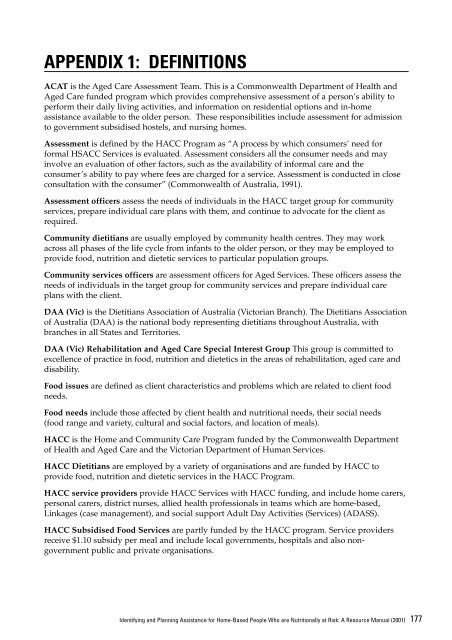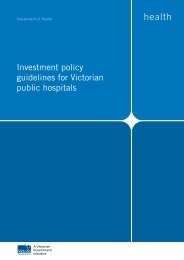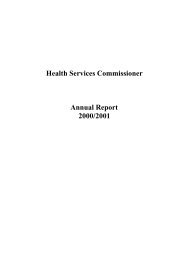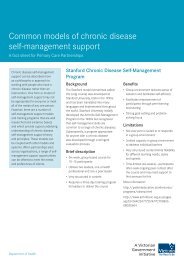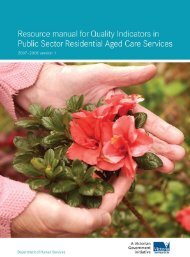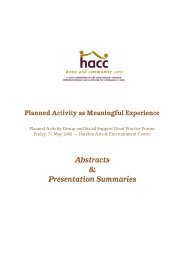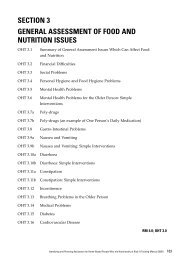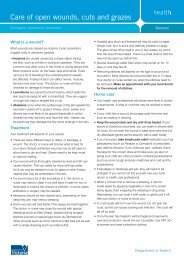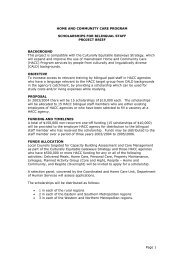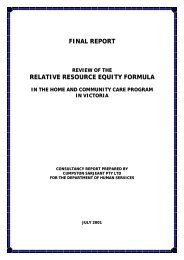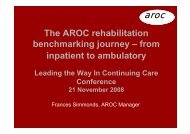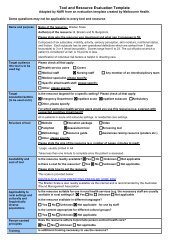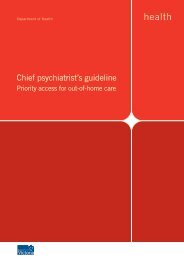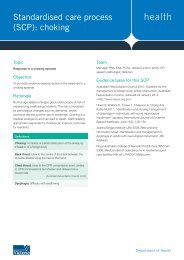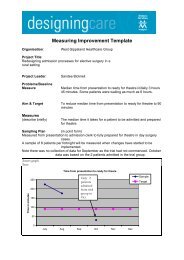Nutritional Risk - Appendix 1 to 4 (70kb, pdf) - Department of Health
Nutritional Risk - Appendix 1 to 4 (70kb, pdf) - Department of Health
Nutritional Risk - Appendix 1 to 4 (70kb, pdf) - Department of Health
Create successful ePaper yourself
Turn your PDF publications into a flip-book with our unique Google optimized e-Paper software.
APPENDIX 1: DEFINITIONS<br />
ACAT is the Aged Care Assessment Team. This is a Commonwealth <strong>Department</strong> <strong>of</strong> <strong>Health</strong> and<br />
Aged Care funded program which provides comprehensive assessment <strong>of</strong> a person’s ability <strong>to</strong><br />
perform their daily living activities, and information on residential options and in-home<br />
assistance available <strong>to</strong> the older person. These responsibilities include assessment for admission<br />
<strong>to</strong> government subsidised hostels, and nursing homes.<br />
Assessment is defined by the HACC Program as “A process by which consumers’ need for<br />
formal HSACC Services is evaluated. Assessment considers all the consumer needs and may<br />
involve an evaluation <strong>of</strong> other fac<strong>to</strong>rs, such as the availability <strong>of</strong> informal care and the<br />
consumer’s ability <strong>to</strong> pay where fees are charged for a service. Assessment is conducted in close<br />
consultation with the consumer” (Commonwealth <strong>of</strong> Australia, 1991).<br />
Assessment <strong>of</strong>ficers assess the needs <strong>of</strong> individuals in the HACC target group for community<br />
services, prepare individual care plans with them, and continue <strong>to</strong> advocate for the client as<br />
required.<br />
Community dietitians are usually employed by community health centres. They may work<br />
across all phases <strong>of</strong> the life cycle from infants <strong>to</strong> the older person, or they may be employed <strong>to</strong><br />
provide food, nutrition and dietetic services <strong>to</strong> particular population groups.<br />
Community services <strong>of</strong>ficers are assessment <strong>of</strong>ficers for Aged Services. These <strong>of</strong>ficers assess the<br />
needs <strong>of</strong> individuals in the target group for community services and prepare individual care<br />
plans with the client.<br />
DAA (Vic) is the Dietitians Association <strong>of</strong> Australia (Vic<strong>to</strong>rian Branch). The Dietitians Association<br />
<strong>of</strong> Australia (DAA) is the national body representing dietitians throughout Australia, with<br />
branches in all States and Terri<strong>to</strong>ries.<br />
DAA (Vic) Rehabilitation and Aged Care Special Interest Group This group is committed <strong>to</strong><br />
excellence <strong>of</strong> practice in food, nutrition and dietetics in the areas <strong>of</strong> rehabilitation, aged care and<br />
disability.<br />
Food issues are defined as client characteristics and problems which are related <strong>to</strong> client food<br />
needs.<br />
Food needs include those affected by client health and nutritional needs, their social needs<br />
(food range and variety, cultural and social fac<strong>to</strong>rs, and location <strong>of</strong> meals).<br />
HACC is the Home and Community Care Program funded by the Commonwealth <strong>Department</strong><br />
<strong>of</strong> <strong>Health</strong> and Aged Care and the Vic<strong>to</strong>rian <strong>Department</strong> <strong>of</strong> Human Services.<br />
HACC Dietitians are employed by a variety <strong>of</strong> organisations and are funded by HACC <strong>to</strong><br />
provide food, nutrition and dietetic services in the HACC Program.<br />
HACC service providers provide HACC Services with HACC funding, and include home carers,<br />
personal carers, district nurses, allied health pr<strong>of</strong>essionals in teams which are home-based,<br />
Linkages (case management), and social support Adult Day Activities (Services) (ADASS).<br />
HACC Subsidised Food Services are partly funded by the HACC program. Service providers<br />
receive $1.10 subsidy per meal and include local governments, hospitals and also nongovernment<br />
public and private organisations.<br />
Identifying and Planning Assistance for Home-Based People Who are <strong>Nutritional</strong>ly at <strong>Risk</strong>: A Resource Manual (2001)<br />
177


